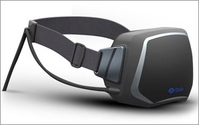Commentary
How Facebook Will Use Oculus To Support Virtual Reality Advertising
- by Laurie Sullivan , Staff Writer @lauriesullivan, March 26, 2014
 At
the San Diego-based Digitaria office earlier this week I took the Oculus Rift virtual reality headset for a rollercoaster ride, one day before Facebook announced it will acquire the company for $2
billion. Despite a focus on VR for gaming on mobile devices like the Sony PS4, there's no doubt the social site will dive headfirst into VR advertising -- although CEO Mark Zuckerberg only referred in
the announcement to entering verticals like communications, media and entertainment.
At
the San Diego-based Digitaria office earlier this week I took the Oculus Rift virtual reality headset for a rollercoaster ride, one day before Facebook announced it will acquire the company for $2
billion. Despite a focus on VR for gaming on mobile devices like the Sony PS4, there's no doubt the social site will dive headfirst into VR advertising -- although CEO Mark Zuckerberg only referred in
the announcement to entering verticals like communications, media and entertainment.
Digitaria President Doug Hecht has an Oculus development kit and described how brands could use the platform to market products and services, making a total immersive experience for consumers. He described an application for travel agencies and airlines providing prospective travelers searching for a thrill with a virtual jeep ride through the backcountry in Africa or a wave in Hawaii before physically visiting the location.
Oculus will bring a brand's clothing line into the consumer's living room. It will allow consumers to try on pants, shirts, dresses and accessories without leaving the comforts of home.
Brands like BMW could highlight the headset in their showroom to demonstrate what it's like to drive their latest model on the Autobahn by approximating the actual head and body rush people get when driving the car. The wearer would get a sense of road traction and the sway of the car.
People actually feel the rush. The visual seen in the screen throws off the equilibrium. Motion sensors detect head movement. The 360 view gives the wearer a fully immersive experience by changing the scenery when looking down, up, back and forward to get the actual feeling of being in the rollercoaster car on a wild, twisted ride.
The future could mean a platform operated by brain waves or voice search to request an experience or fast forward to a different point in the video. The technology exists. Facebook engineers only need to find a way to integrate it.
"While Facebook has made good progress in mobile, the company believes vision and virtual reality, including Oculus devices, could become the next big computing platform," Doug Anmuth, J.P. Morgan analyst, wrote in a research note. "Facebook views the acquisition as another step toward building the 3 key pillars of its long-term strategy, which include connecting everyone, understanding the world, and building the knowledge economy."
Anmuth believes that Facebook envisions people sharing not just moments, but also experiences using Oculus' immersive virtual reality technology.
Pivotal analyst Brian Wieser wrote in a research note about the potential for virtual reality
computing in applications other than games. He sees potential in education, health care, workplace activity and other fields. "All of these use cases can be construed to have social attributes,
although they fall a fair degree away from social media and even further away from ad sales, at least so far as we can envision the medium today," he wrote.
I highly recommend even the
unadventurous type to give these VR glasses a spin.



